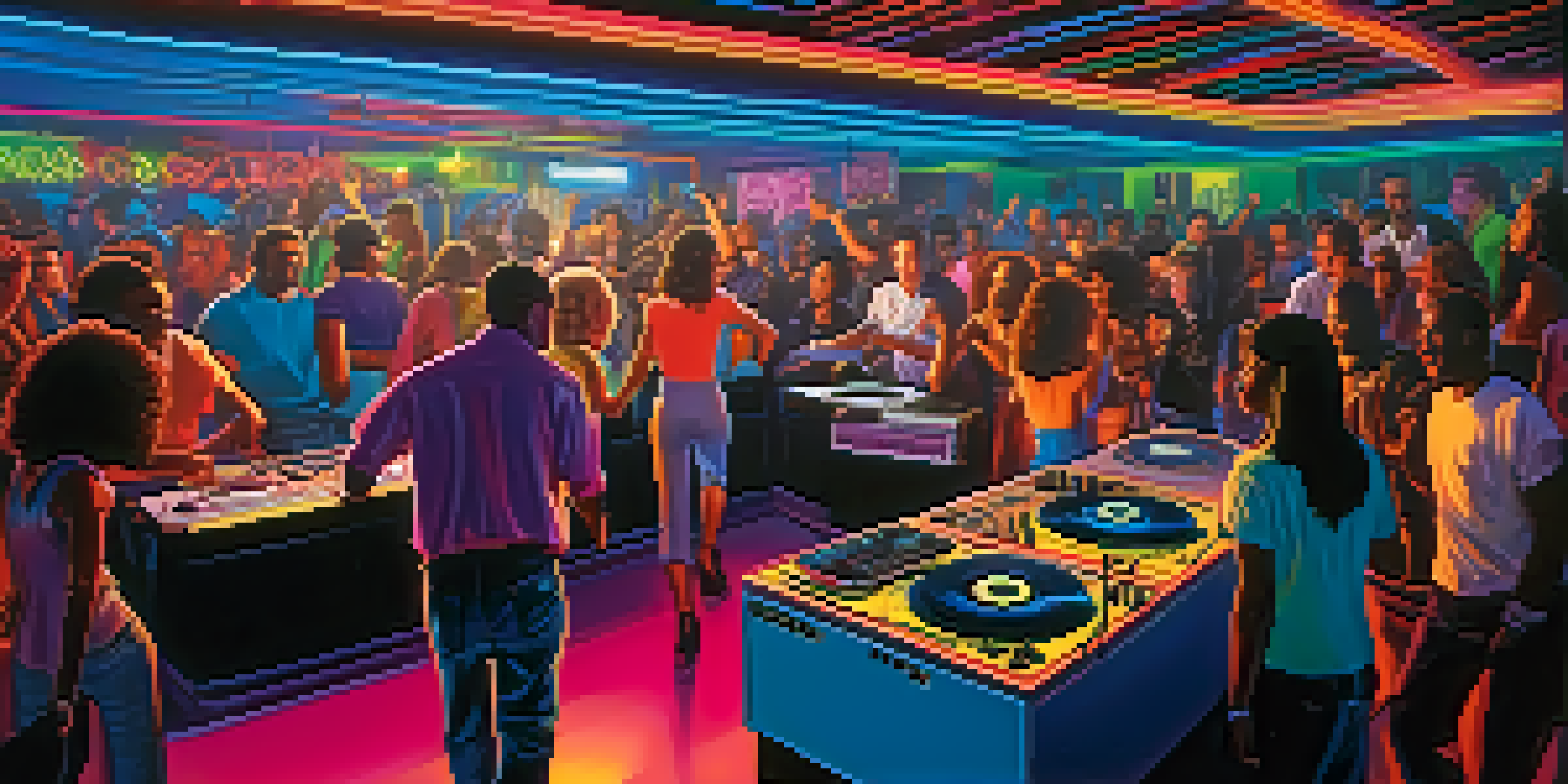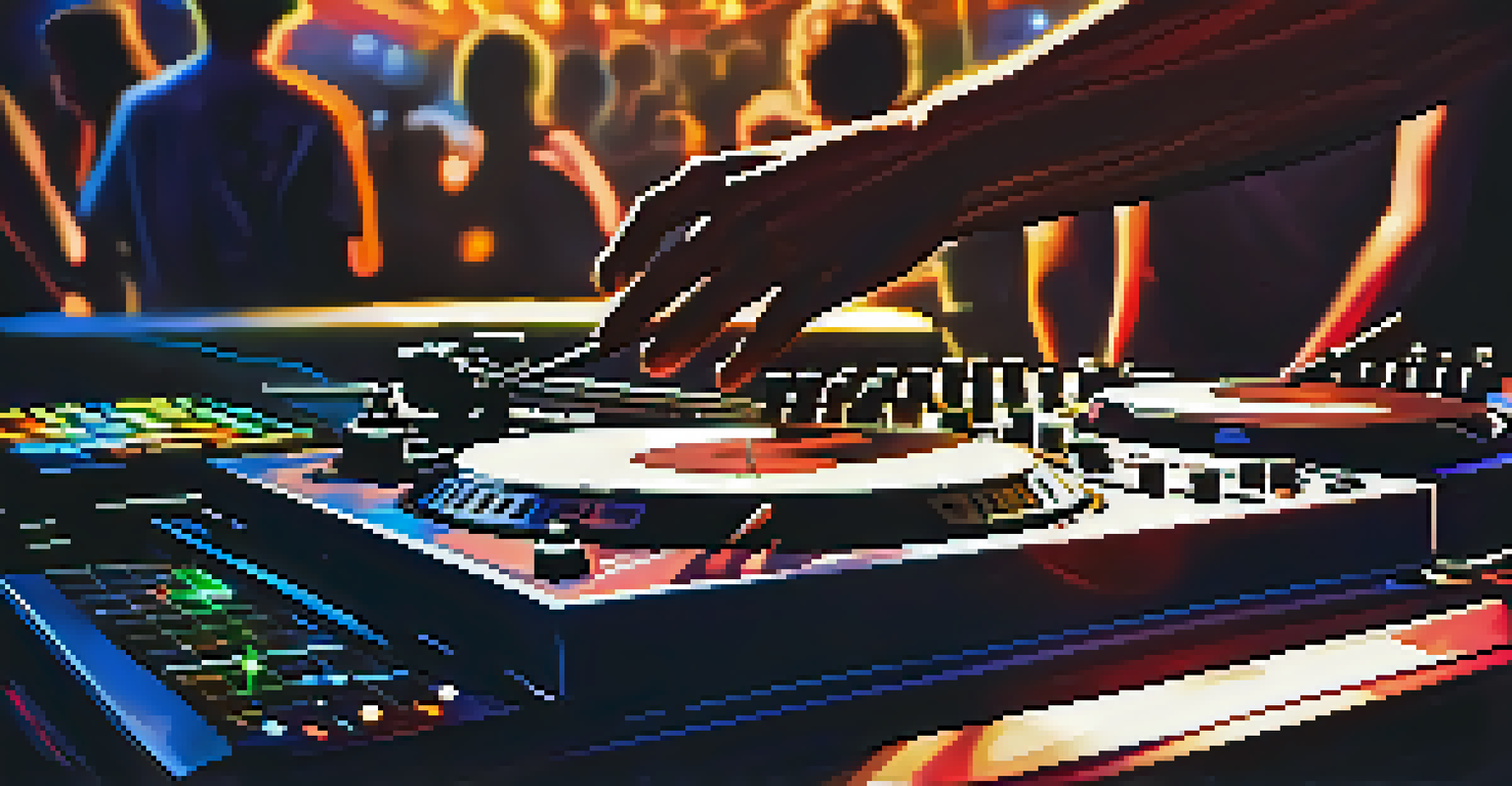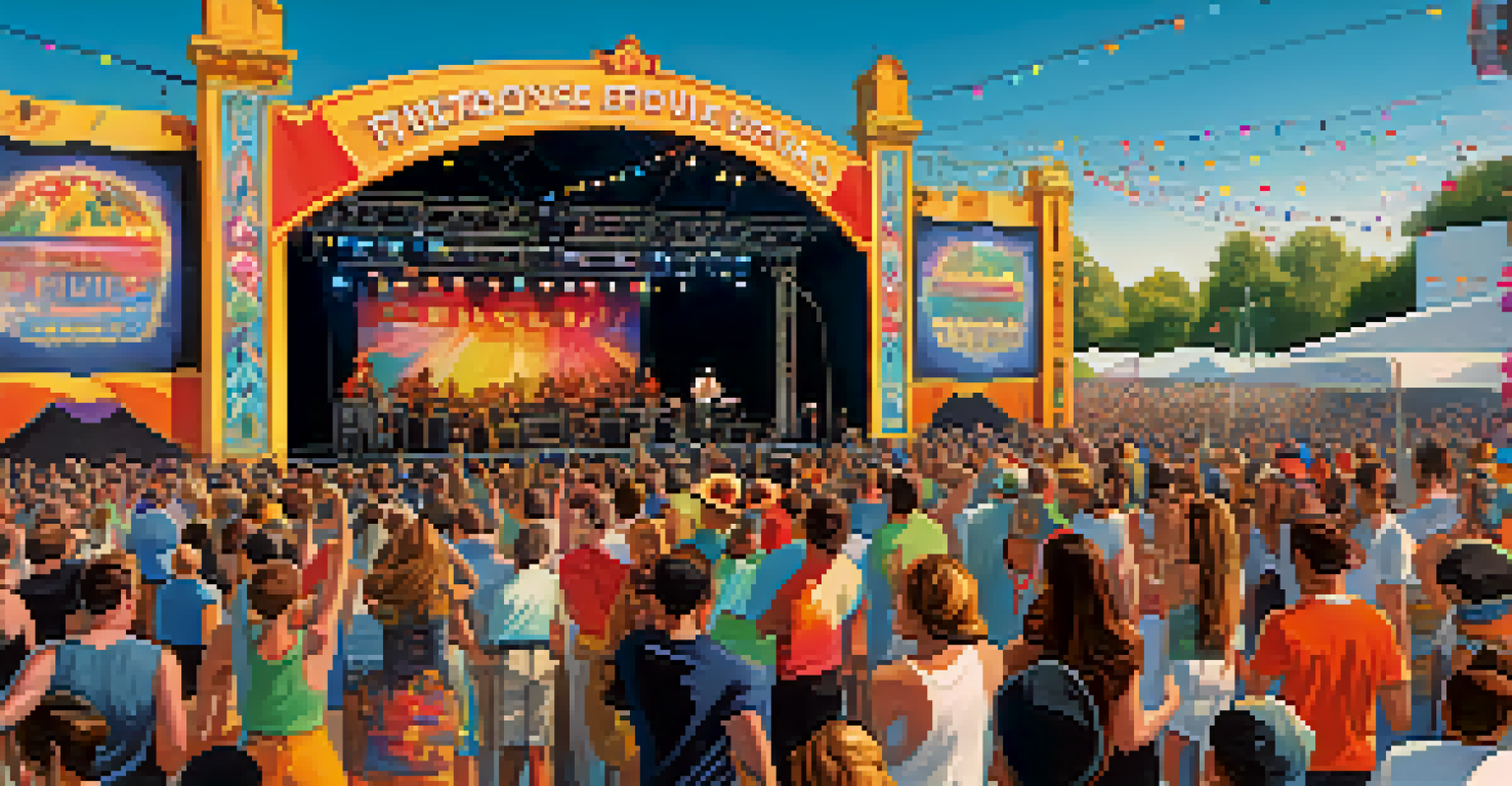House Music Origins: Chicago's Influence on Global Beats

The Birth of House Music in Chicago's Nightclubs
House music originated in Chicago during the late 1970s and early 1980s, primarily within the vibrant club scene. Venues like The Warehouse and The Power Plant became the breeding grounds for this fresh sound, where DJs like Frankie Knuckles and Ron Hardy experimented with disco tracks, blending them with more electronic elements. The genre was named after The Warehouse, where Knuckles spun records, creating a unique atmosphere that resonated with the city's diverse community.
House music is a feeling, a culture, a way of life that was born in the clubs of Chicago.
As DJs began mixing beats with soulful vocals and synthesized melodies, house music attracted a dedicated following. This new sound was more than just music; it was a cultural movement that provided a space for self-expression and inclusivity. The communal experience of dancing together in dimly lit clubs fostered a sense of belonging among attendees, regardless of their backgrounds.
The early house tracks were often characterized by repetitive rhythms and catchy hooks, making them perfect for long nights on the dance floor. This infectious sound quickly spread beyond Chicago, laying the groundwork for a global movement that would evolve over the decades. Chicago's influence on house music remains undeniable, with many artists and DJs tracing their roots back to that iconic city.
Key Figures in Chicago's House Music Scene
Several key figures played pivotal roles in the development of house music in Chicago. Frankie Knuckles, often referred to as the 'Godfather of House,' was instrumental in shaping the genre's sound with his innovative mixing techniques and deep appreciation for disco. His ability to read the crowd and curate the perfect playlist made him a legendary figure in the music community.

Another notable figure is Ron Hardy, known for his electric energy and eclectic musical selections. His residency at The Music Box showcased his talents, where he would often play records at an ear-shattering volume, creating an unforgettable experience for his audience. Hardy's passion for music and unique style influenced countless aspiring DJs, solidifying his place in house music history.
Origin of House Music in Chicago
House music emerged in Chicago's nightclubs during the late 1970s and early 1980s, influenced by DJs like Frankie Knuckles and Ron Hardy.
Additionally, other artists like Larry Heard and Marshall Jefferson contributed to the genre's evolution with their distinctive styles. They experimented with different sounds, leading to the emergence of sub-genres such as deep house and soulful house. Together, these pioneers helped define what house music would become and inspired future generations of musicians.
Cultural Influences on House Music's Evolution
House music is a melting pot of various cultural influences, reflecting the rich diversity of Chicago itself. The genre draws heavily from disco, soul, funk, and even gospel music, creating a sound that resonates with many. This blend of styles allowed house music to reach a broad audience, transcending racial and social barriers.
The beauty of house music is that it is always evolving, always adapting to the times, yet rooted in a sense of community.
The LGBTQ+ community also played a significant role in house music's rise, as many early fans and artists identified with the genre's themes of liberation and self-acceptance. Clubs became safe havens where individuals could express themselves freely, fostering a culture of inclusivity and love. This sense of community was vital in shaping the sound and message of house music.
As house music evolved, it began to incorporate elements from other genres, including techno, hip-hop, and even rock. This constant experimentation allowed the genre to remain fresh and relevant, appealing to a diverse audience. The cultural exchange that took place in Chicago's clubs laid the foundation for house music's global reach and continued evolution.
House Music's Global Expansion in the 1990s
By the 1990s, house music had firmly established itself on the global stage. Clubs and rave scenes across Europe, especially in the UK, embraced the genre, leading to the rise of iconic festivals and events. The infectious beats and uplifting melodies of house music attracted fans worldwide, prompting DJs and producers to explore new sounds and styles.
In cities like London, Paris, and Berlin, local scenes began to emerge, each with its unique take on house music. Artists from these areas started to gain recognition, further expanding the genre's influence. The 1990s also saw the birth of sub-genres such as progressive house and acid house, showcasing the genre's versatility and creativity.
Cultural Diversity Shaping the Sound
The genre incorporates elements from disco, soul, and the LGBTQ+ community, fostering a culture of inclusivity and self-expression.
This global expansion was fueled by the rise of digital technology, making it easier for DJs to share their mixes and tracks online. As a result, house music became accessible to a broader audience, creating a thriving community of fans and musicians. The genre's evolution during this period solidified its place in the music industry and set the stage for its future.
The Impact of Technology on House Music Production
Technology has played a crucial role in shaping the sound of house music over the years. The introduction of synthesizers, drum machines, and sequencers allowed producers to experiment with new sounds and create tracks that were previously unimaginable. This technological evolution enabled artists to push the boundaries of house music, leading to innovative compositions that captivated audiences.
Software such as Ableton Live and FL Studio revolutionized music production, making it accessible to aspiring musicians and DJs. With these tools, producers could create high-quality tracks from the comfort of their own homes, fostering a DIY culture within the house music scene. This empowerment encouraged new talent to emerge, contributing to the genre's ever-evolving landscape.
As technology continues to advance, house music adapts and incorporates new elements, such as virtual reality and AI-generated sounds. This willingness to embrace change keeps the genre fresh and exciting, appealing to both long-time fans and newcomers alike. The synergy between technology and creativity remains a driving force behind house music's enduring popularity.
The Resurgence of House Music in the 21st Century
In recent years, house music has experienced a remarkable resurgence, captivating a new generation of listeners. With the rise of streaming platforms, it has become easier than ever for fans to discover both classic tracks and emerging artists. This accessibility has reignited interest in house music, leading to a revival of the genre's foundational sounds.
Festivals and events celebrating house music have also gained popularity, drawing large crowds and showcasing talented performers. Events like Tomorrowland and Coachella feature house music acts alongside more mainstream genres, highlighting the genre's versatility and appeal. This renewed interest has helped bridge the gap between generations, as older fans share their love for house music with younger audiences.
House Music's Modern Resurgence
In the 21st century, house music has seen a revival, appealing to new generations through streaming platforms and genre-blending collaborations.
Moreover, collaborations between established artists and rising stars continue to push house music into the mainstream. Tracks that blend house elements with pop, hip-hop, and other genres are dominating charts, demonstrating the genre's adaptability. As house music continues to evolve, its influence on global beats remains strong, ensuring that its legacy endures.
The Future of House Music: Trends and Directions
Looking ahead, the future of house music is filled with exciting possibilities. As genres continue to blend, we can expect to see even more innovative sounds emerging from the house music scene. Collaborations across genres will likely continue to thrive, allowing for fresh and unexpected musical combinations that resonate with diverse audiences.
Additionally, the rise of online communities and social media platforms will play a significant role in shaping the future of house music. With artists able to connect with fans directly, new trends can emerge quickly, allowing for real-time feedback and collaboration. This interconnectedness fosters a vibrant and dynamic environment for creativity, ensuring that the genre remains relevant.

As house music continues to evolve, its roots in Chicago will always be cherished. The genre's ability to adapt while staying true to its origins is a testament to its resilience and enduring appeal. With a rich history and a bright future ahead, house music will undoubtedly continue to influence global beats for years to come.